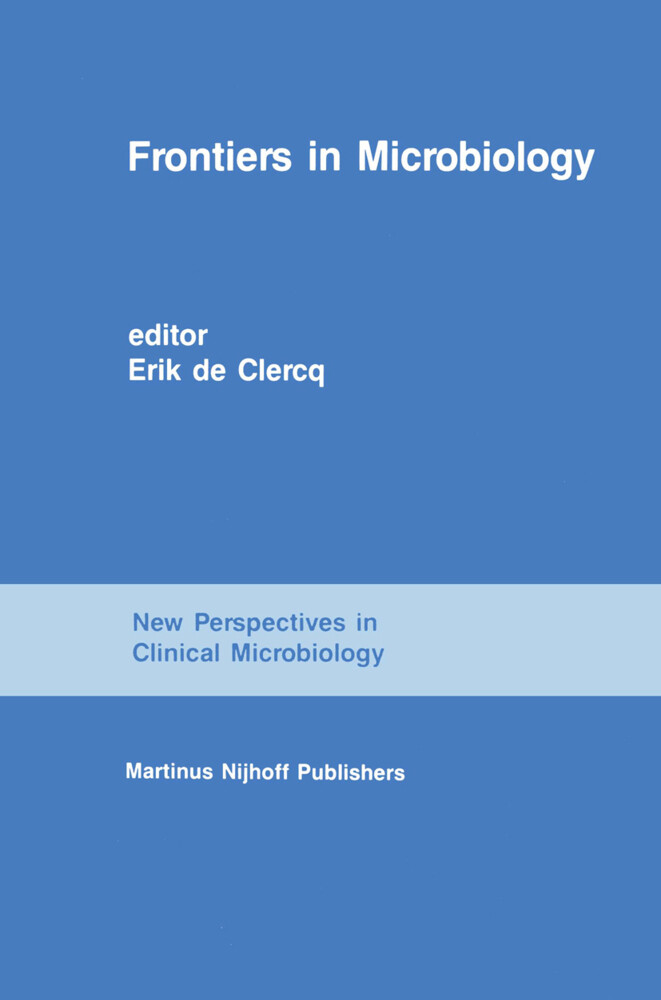
Zustellung: Do, 28.11. - Sa, 30.11.
Versand in 2 Tagen
VersandkostenfreiBestellen & in Filiale abholen:
The International Symposium on Frontiers in Microbiology has been de dicated to Prof. P. De Somer, whom I succeeded shortly after his death on 17 June 1985 as Rector of this now more than 560-year old University. When Prof. De Somer became the head of the University he started to remodel it, giving our old Alma Mater a more transparent administrative structure, strengthening its scientific and cultural autonomy, and establishing close links with the most prestigious national and foreign institutions. This made De Somer to one of the greatest, if not the greatest, of rectors in the history of Belgian Universities. He was a great leader, a perfect organizer, a clever negotiator, and a brilliant orator. In his speeches one immediately sensed his intuitive cognition and witty evaluation of the values of life. He knew perfectly well how to persuade the unwilling and to disenchant the illusionist. Sometimes a visionary himself, he would not pursue his ideas unless there was a chance of success. As innovative Prof. P. De Somer was in providing to this University a new face, or should I say facelifting, as international is his reputation as the founder, and, since its inception, only director, of the Rega Institute. Built now more than 30 years ago, the Rega Institute has re mained one of the world's leading centers in microbiological research.
Inhaltsverzeichnis
A. Review Lectures by Invited Speakers. - Section I: Chemotherapy. - - Introduction to Section I. - - ? -Lactam antibiotics as carbonyl donors of the active-site serine ? -lactamases, DD-peptidases and LL-peptidases. - - New antifungal agents: a result of target-oriented drug design. - - Antiviral chemotherapy: design or serendipity ? . - Section II: Intestinal Microflora. - - Introduction to Section II. - - The indigenous gastrointestinal microflora. - - Metabolism of endogenous substances. - - Seeking explanations for pharmacological and toxicological phenomena in the metabolic reactions of the intestinal flora. - Section III: Humoral Factors in Immunity. - - Introduction to Section III. - - Mechanisms of natural resistance. - - Regulation of cell growth by interferon and tumor necrosis factor. - - The role of interleukin-1 in mediating host defense mechanisms. - Section IV: Tumor Immunity. - - Introduction to Section IV. - - Mechanisms of resistance to viruses and tumors, and the development of vaccines. - - Total lymphoid irradiation. - Section V: New Horizons in Virus Research. - - Introduction to Section V. - - Perspectives in disease prevention by vaccines. - - The challenge of chronic virus infections. - - Structure and function of the genome of HTLV-III and related viruses: current concepts on the role of HTLV-III in the pathogenesis of AIDS. - B. Contributions from the Rega Institute. - I. Research Unit. - - Synthesis and activity of some new cephalosporins. - - Incorporation of nucleoside analogues into oligonucleotides. - - 2? -5? -Oligoadenylates (2 5A) as mediators of interferon action. Synthesis and biological activity of new 2 5A analogues. - II. Research Unit. - - Cloning and expression of an rRNA methylase gene in Streptomyces venezuelae phage VWB. - - Coprostanic acids and aC29-dicarboxylic bile acid in peroxisomal diseases. - - Bile acid desulfation by the gut microflora. - - Steroid desulfation by the gut microflora. - - Biohydrogenation of fatty acids by intestinal bacteria. - - Classification of the genus Eubacterium. - - Isolation and characteristics of Clostridium HDCA-1, nova species. - III. Research Unit. - - Heterogeneity of recombinant murine interferon-? (MuIFN-?). - - Monoclonal antibodies against murine interferon-? and their use to investigate the role of endogenous interferon-? invivo. - - The interrelationship between interleukin-1, interferon-? and hemopoietic growth factors. - - Studies on gene expression in Streptomyceslividans. - IV. Research Unit. - - The influence of local immune suppression on polyoma virus-induced vascular tumors. - - Induction of transplantation tolerance after total lymphoid irradiation: influence of thymus transplantation or blood transfusions. - V. Research Unit. - - Mechanism of antiviral action of 5-substituted 2? -deoxyuridines: (E)-5-(2-iodovinyl)-2? -deoxyuridine (IVDU) as compared to its carbocyclic analogue (C-IVDU). - - Therapeutic implications of the unusually long half-life of (E)-5-(2-bromovinyl)uracil (BVUra) in vivo. - - S-Adenosyl-L-homocysteine hydrolase as target enzyme for antiviral agents: studies with adenosine kinase-deficient rat cells. - - Antiviral activity of (S)-9-(3-hydroxy-2-phosphonylmethoxypropyl)-adenine [(S)-HPMPA]. - - Selective inhibitory effects of (S)-9-(3-hydroxy-2-phosphonyl-methoxypropyl)adenine and 2? -nor-cGMP on the replication of adenovirus invitro. - - In search of antiviral compounds against the AIDS virus.
Produktdetails
Erscheinungsdatum
20. September 2011
Sprache
englisch
Auflage
Softcover reprint of the original 1st ed. 1987
Seitenanzahl
336
Reihe
New Perspectives in Clinical Microbiology
Herausgegeben von
Erik de Clercq
Verlag/Hersteller
Produktart
kartoniert
Abbildungen
XVIII, 314 p.
Gewicht
511 g
Größe (L/B/H)
235/155/19 mm
Sonstiges
Paperback
ISBN
9789401080064
Entdecken Sie mehr
Bewertungen
0 Bewertungen
Es wurden noch keine Bewertungen abgegeben. Schreiben Sie die erste Bewertung zu "Frontiers in Microbiology" und helfen Sie damit anderen bei der Kaufentscheidung.









